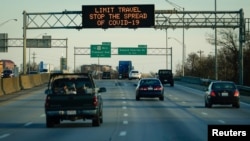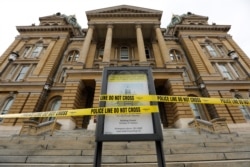"Stay calm, stay safe, stay home," Pennsylvania Gov. Tom Wolf urged his residents while announcing his shutdown order.
At least 13 states, including California, Connecticut and Delaware, issued executive orders this week to close bars and restaurants, limiting their service to carry-out and delivery orders.
With thousands of new coronavirus cases across the U.S., states are implementing aggressive actions to stop the rapid spread of the virus. Some governors gave clear warnings to people who aren't heeding them.
"I would say to them, weeks from now, months from now, when one of those partygoers, one of those people that they defied the order to have into their establishment becomes sick … somebody perhaps that might die, that they should know that they are responsible for that. And they should not hold these parties," Illinois Gov. J.B. Pritzker said in a press conference Monday.
California, Florida, Georgia, Maine and Tennessee declared states of emergency, and New Jersey set a statewide curfew from 8 p.m. to 5 a.m.
Lessons learned
Governors say they learned lessons from different responses to massive coronavirus outbreaks in other countries.
"You look at Hong Kong, in Asia, where they really have strong, forceful social-distancing measures and how they were able to flatten that curve and to save hundreds of thousands of lives. We also look at Italy and France, where it's a freer society. Perhaps they weren't able to be quite as forceful," noted Connecticut Gov. Ned Lamont.
Maryland Gov. Larry Hogan also said he wants to avoid situations similar to that of Italy and other parts of Europe.
"We're hopefully starting early enough to stop some of the things that happened in Italy. We would rather be Denmark than Italy. And you see what happened in Spain and France," Hogan said. "We're trying to take actions earlier than other people around the country have or the world have."
Innovative ideas
While school and bar closures are among the most common steps taken across the nation, some states announced more unique actions.
Alaska state officials are seeking to establish new quarantine facilities, using motel rooms, apartments and trailers. California's executive order includes authority for the state to take over hotels and motels for medical use for potential coronavirus patients. Georgia is also constructing a space for people who test positive but are unable to self-quarantine.
Florida and Texas are among many states that are building drive-through testing facilities.
Providing wireless internet access is also an important issue, as many schools are turning to online education. South Carolina state authorities are working to equip some school buses with Wi-Fi in remote areas to accommodate students. In North Carolina, school buses will be used to deliver food to students.
Health care coverage
States are also taking actions to reduce the medical costs for testing and treatment of coronavirus.
New York, Washington, Alaska, California, Colorado, Maryland and Nevada issued emergency directives prohibiting private medical insurance carriers from imposing cost-sharing on enrollers for coronavirus testing and expanding coverage on treatment, according to Kevin Lucia, a professor at Georgetown University's Center on Health Insurance Reform.
"Given the number of states that have issued emergency declarations in the last couple of days, there's probably going to be many more states that come on board and requiring their issuers to cover these services," Lucia said in a teleconference Tuesday hosted by the Commonwealth Fund.
At the same event, Sara Collins, vice president of the Commonwealth Fund, said, "In terms of making it easier for people to get tested if they need to, in that sense, learning is happening from other countries."



